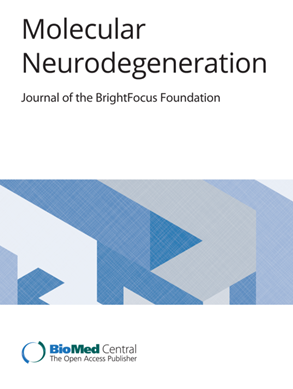Mutations in PSEN1 predispose inflammation in an astrocyte model of familial Alzheimer’s disease through disrupted regulated intramembrane proteolysis
IF 17.5
1区 医学
Q1 NEUROSCIENCES
引用次数: 0
Abstract
Mutations in PSEN1 cause familial Alzheimer’s disease with almost complete penetrance. Age at onset is highly variable between different PSEN1 mutations and even within families with the same mutation. Current research into late onset Alzheimer’s disease implicates inflammation in both disease onset and progression. PSEN1 is the catalytic subunit of γ-secretase, responsible for regulated intramembrane proteolysis of numerous substrates that include cytokine receptors. For this reason, we tested the hypothesis that mutations in PSEN1 impact inflammatory responses in astrocytes, thereby contributing to disease progression. We developed patient-derived models of iPSC-astrocytes, representing three lines harbouring PSEN1 mutations and six control lines (including two isogenic controls). Transcriptomic and biochemical assays were used to investigate differential inflammatory responses to TNFα, IL1α and C1Q. We show that PSEN1 is upregulated in response to inflammatory stimuli, and this upregulation is disrupted by pathological PSEN1 mutations. Using transcriptomic analyses, we demonstrate that PSEN1 mutant astrocytes have an augmented inflammatory profile in their basal state, concomitant with gene expression signatures revealing dysregulated intramembrane proteolysis and JAK-STAT signalling. Detailed investigation of the JAK-STAT2 signalling pathway showed reduced cell surface expression of IFNAR2, lower STAT2 phosphorylation cascades and delayed NFκB nuclear localisation in PSEN1 mutant astrocytes in response to inflammatory stimuli, thereby implicating the notion of altered cytokine signalling cascades. Finally, we use small molecule modulators of γ-secretase to confirm a role for PSEN1/γ-secretase in regulating the astrocytic response to inflammatory stimuli. Together, these data suggest that mutations in PSEN1 enhance cytokine signalling via impaired regulated intramembrane proteolysis, thereby predisposing astrocytic inflammatory profiles. These findings support a two-hit contribution of PSEN1 mutations to fAD pathogenesis, not only impacting APP and Aβ processing but also altering the cellular response to inflammation.在家族性阿尔茨海默病星形细胞模型中,PSEN1突变通过被破坏的膜内蛋白水解使炎症易感
PSEN1突变几乎完全外显导致家族性阿尔茨海默病。发病年龄在不同的PSEN1突变之间,甚至在具有相同突变的家庭中都是高度可变的。目前对晚发性阿尔茨海默病的研究表明,炎症与疾病的发病和进展有关。PSEN1是γ-分泌酶的催化亚基,负责调节包括细胞因子受体在内的多种底物的膜内蛋白水解。因此,我们测试了PSEN1突变影响星形胶质细胞炎症反应的假设,从而促进疾病进展。我们开发了患者来源的ipsc星形胶质细胞模型,代表了三个携带PSEN1突变的系和六个控制系(包括两个等基因对照)。转录组学和生化分析用于研究TNFα、il - 1α和C1Q的不同炎症反应。我们发现PSEN1在炎症刺激下上调,而这种上调被病理性PSEN1突变破坏。通过转录组学分析,我们证明PSEN1突变的星形胶质细胞在其基础状态下具有增强的炎症谱,同时伴有揭示膜内蛋白水解和JAK-STAT信号失调的基因表达特征。对JAK-STAT2信号通路的详细研究表明,PSEN1突变星形胶质细胞在炎症刺激下,IFNAR2的细胞表面表达减少,STAT2磷酸化级联反应降低,NFκB核定位延迟,从而暗示细胞因子信号级联反应改变的概念。最后,我们使用γ-分泌酶的小分子调节剂来确认PSEN1/γ-分泌酶在调节星形细胞对炎症刺激的反应中的作用。综上所述,这些数据表明PSEN1突变通过受损的膜内蛋白水解增强细胞因子信号,从而诱发星形细胞炎症。这些发现支持PSEN1突变对fAD发病机制的双重作用,不仅影响APP和a β加工,还改变细胞对炎症的反应。
本文章由计算机程序翻译,如有差异,请以英文原文为准。
求助全文
约1分钟内获得全文
求助全文
来源期刊

Molecular Neurodegeneration
医学-神经科学
CiteScore
23.00
自引率
4.60%
发文量
78
审稿时长
6-12 weeks
期刊介绍:
Molecular Neurodegeneration, an open-access, peer-reviewed journal, comprehensively covers neurodegeneration research at the molecular and cellular levels.
Neurodegenerative diseases, such as Alzheimer's, Parkinson's, Huntington's, and prion diseases, fall under its purview. These disorders, often linked to advanced aging and characterized by varying degrees of dementia, pose a significant public health concern with the growing aging population. Recent strides in understanding the molecular and cellular mechanisms of these neurodegenerative disorders offer valuable insights into their pathogenesis.
 求助内容:
求助内容: 应助结果提醒方式:
应助结果提醒方式:


